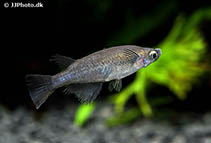| Family: |
Adrianichthyidae (Ricefishes), subfamily: Oryziinae |
| Max. size: |
3.3 cm SL (male/unsexed) |
| Environment: |
benthopelagic; freshwater |
| Distribution: |
Asia: Endemic to Lake Poso and its tributary stream, Sulawesi, Indonesia. |
| Diagnosis: |
Dorsal soft rays (total): 9-11; Anal soft rays: 21-22; Vertebrae: 30-32. Having a unique sexual dichromatism: adult males dark gray to black in color, while females lighter grayish-yellow to brown. Some adult males possess external conical teeth on the jaws. Lateral process of pelvic bone is in line with the third or fourth pleural rib; precaudal vertebrae 11-13, modally 12; and dorsal fin relatively anterior (origin above 12-14th anal-fin ray); straight, narrow and slender ossified and cartilaginous portions of the gill arches. Dorsal body profile arches gently from head to dorsal-fin origin (Ref. 54508). |
| Biology: |
Collected in the morning in clear water over a bottom of sand, pebbles and fallen branches and during night time from a boat traveling along the lake shore, including the mouth of the tributary stream (Ref. 54508). Infested with parasitic copepods, Lernaea sp. (Ref. 54508). |
| IUCN Red List Status: |
Near Threatened (NT); Date assessed: 16 November 2018 (B1b(iii)) Ref. (130435)
|
| Threat to humans: |
harmless |
Source and more info: www.fishbase.org. For personal, classroom, and other internal use only. Not for publication.
